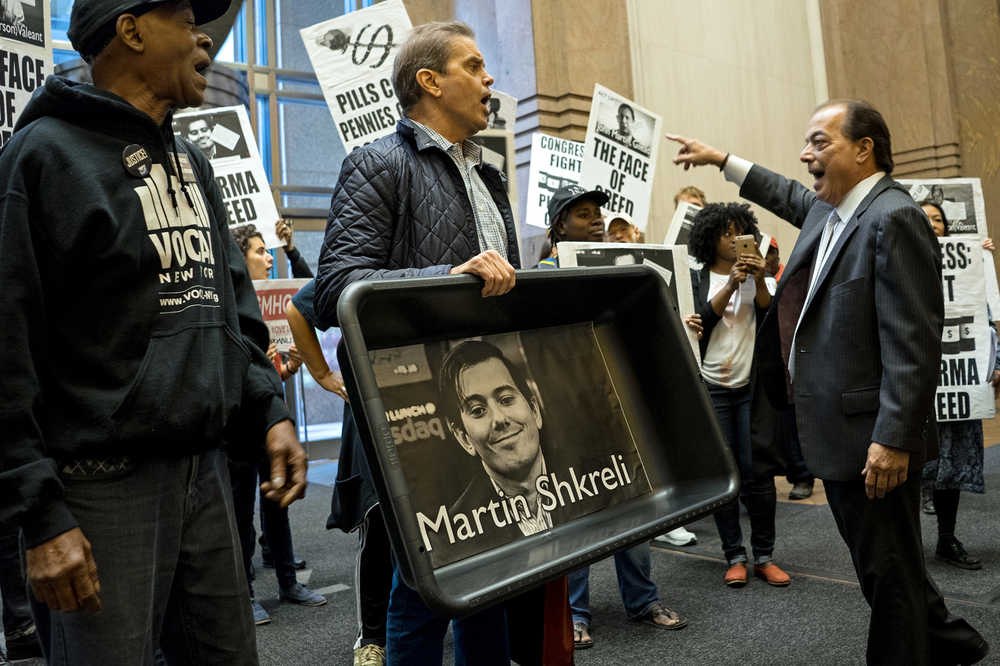WASHINGTON — The same strategy that Martin Shkreli used to get away with a 5,000-percent price increase on an old drug is used by many other drugmakers to maintain sky-high prices on billions of dollars’ worth of medications.
Before the price hike that made him infamous, the former CEO of Turing Pharmaceuticals had to ensure that no competitor would be able to launch a cheaper version of Daraprim, the 60-year-old anti-infection pill that is no longer under patent.
Shkreli had the perfect weapon: a tightly-controlled distribution system which would make it virtually impossible for a competitor to obtain enough Daraprim to develop their own version.
Shkreli, who resigned in December, did not invent the closed distribution technique. And his former company, Turing, notes that Daraprim was already distributed under such a system when it acquired the drug.
Many larger drugmakers have also turned drug distribution into a powerful tool against competition. The strategy takes advantage of a simple fact: If generic drugmakers can’t get their hands on the original product, they cannot perform the tests needed to develop a generic version. Typically generic drugmakers purchase drugs in bulk from third-party suppliers. But when the original drugmaker controls the drug’s distribution, they can simply refuse to sell.
The effect on patients is higher prices for drugs that would otherwise be available as low-cost generics. Doctors say these tactics “continue to stand in the way of patients’ access.”
“The most effective way to improve access and lower prices is to ensure that generic drugs get to market as quickly as possible,” says Dr. Ameet Sarpatwari, of Harvard Medical School, who has studied the issue.
At least 40 drugs worth an estimated $5.4 billion are sheltered from competition by distribution hurdles, according to a study commissioned by the Generic Pharmaceutical Association, an industry trade group.
The Food and Drug Administration is aware of the misuse of distribution programs. The agency said in a statement it has received 100 letters from companies that say they have been blocked from obtaining drugs for testing purposes. The agency’s own regulations prohibit drugmakers from using certain types of distribution plans to block generic access, but the agency does not penalize companies for the practice.
The trend began in 2007, when the FDA began requiring risk-management plans for certain drugs. The plans often feature various restrictions to make sure drugs are used safely, including limits on who can distribute them. But drugmakers realized these measures could also be used to keep their drugs away from competitors. And even drugs that didn’t require risk-management could utilize the strategy.
Daraprim is an example of a drug that has no major safety risks and was previously available through various wholesalers and distributors. But last June — three months before its sale to Turing — Daraprim was moved into a closed distribution program, allowing the manufacturer to refuse sales to competitors.
The effect for patients was jarring. The drug — which treats an infection mainly found in people with HIV and cancer — had previously been available through local pharmacies. Now it is distributed through a specialty division of Walgreen’s, which sells the drug at Turing’s list price of $750 per pill. In the months after the price hike, some patients faced co-pays as high as $16,000 when trying to fill a prescription.
“Mr. Shkreli set up a very complicated system to ensure profits and patients have really suffered,” says Sean Dickson, of the National Alliance of State and Territorial AIDS Directors.
Turing says it has improved access to Daraprim, including making it available through a patient assistance program for those that can’t afford it.
Drugmakers argue that closed distribution simply protects their interests, making sure drugs are shipped and handled appropriately.
But generic drugmakers say the tactics threaten their business model.
“It undermines the whole generic drug approval process,” said Steve Giuli, an executive with generics firm Apotex Corp.
Apotex has repeatedly tried to purchase two specialty cancer drugs sold by drugmaker Celgene. Together the drugs, Thalomid and Revlimid, account for $5.2 billion in sales, more than two-thirds of Celgene’s revenue for 2014. That’s the despite the fact that Thalomid is a 1950s-era drug whose key ingredient is no longer under patent. Because the drug can cause severe birth defects, it is subject to a rigorous distribution program controlled by Celgene.
“They will never freely sell you the product, even if you negotiate with them for weeks, months, and perhaps years to satisfy all of their onerous concerns,” says Omar Jabri, another Apotex executive.
A Celgene spokesman did not return calls and emails seeking comment on the risk-management program.
In one case, New Jersey-based Celgene went on the offensive, suing Barr Laboratories for attempting to introduce a generic version of Thalomid. Celgene said Barr’s effort would infringe on its intellectual property, since it had patented Thalomid’s risk-management plan.
When generic drugmaker Lannett sued Celgene in 2012, alleging that the company’s tactics illegally blocked competition, the companies reached an out-of-court settlement. Details of the agreement were not disclosed but Thalomid remains unavailable as a generic.
Meanwhile, the FDA has remained on the sidelines.
“The FDA is hesitant to make a call on whether a manufacture is actually intending to delay generic competition,” explains pharmaceutical attorney Kurt Karst.
With no apparent solution from the courts or the FDA, generic drugmakers and their allies are seeking a fix from Congress.
A bill introduced in the House would direct the FDA to impose stiff fines on drugmakers that refuse to sell their products to generic drugmakers.
Introduced last summer, the legislation has made little headway on Capitol Hill, but Dr. Sarpatwari hopes recent concerns about drug prices will attract more attention to the proposal.
“You’re getting Congress to amend the system to require that drug samples be shared under the penalty of actual sanctions,” he says. “That’s ultimately where we need to get to.”

